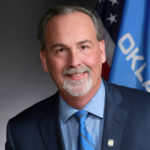The Oklahoma Senate Business and Insurance Committee passed three bills which could pave the way for the state to legalize sports betting. Senate Bill 585, Senate Bill 125, and Senate Bill 164 are considered works in progress, but lawmakers felt it necessary to push them forward as negotiations are about to get underway.
 Senator Bill Coleman, who chairs the Committee, says these three bills will provide different avenues for the Oklahoma Legislature to adopt sports betting. The move will involve Oklahoma’s compact gaming tribes and the Oklahoma City Thunder.
Senator Bill Coleman, who chairs the Committee, says these three bills will provide different avenues for the Oklahoma Legislature to adopt sports betting. The move will involve Oklahoma’s compact gaming tribes and the Oklahoma City Thunder.
Coleman is the author of SB 585 which allows Oklahoma’s tribes to offer in-person sports betting at their casinos and mobile betting on tribal land. It also provides a way for the Oklahoma City Thunder to obtain a gaming license to offer mobile sports betting on non-tribal land. The state would receive ten percent of the net sports book.
“As more states legalize sports betting, Oklahoma can’t afford to fall behind,” said Coleman. “With more Native American tribes and tribal casinos than any other state and a passionate sports fanbase, Oklahoma is uniquely positioned to transform this industry into a thriving economic driver. Legalizing sports gaming will generate millions in new revenue and create new jobs across the state — it’s already happening in the 39 other states that have jumped on the bandwagon. I’m optimistic that this is the year Oklahoma’s tribes, the Oklahoma City Thunder, the governor and other stakeholders will come together to find a compromise everyone can get behind.”
Senator Dave Rader authored Senate Bill 125. That legislation would modify the terms of the model gaming compact to allow tribes to offer mobile and in-person sports gaming. Exclusivity fees would be in the range of five to seven percent.
Senate Bill 164 is being carried by Senator Casey Murdock. It would give the Lottery Commission the job to regulate sports betting through a “sports polls” license. Tribal nations and non-tribal entities would be allowed to apply. Those receiving a license would be required to pay a 15 percent fee on adjust gross revenues.


